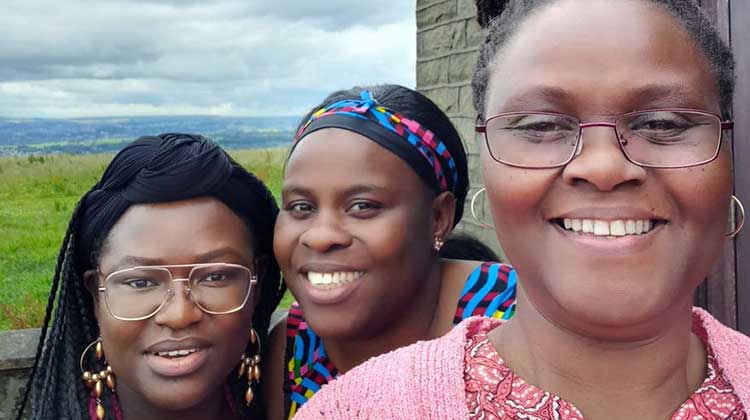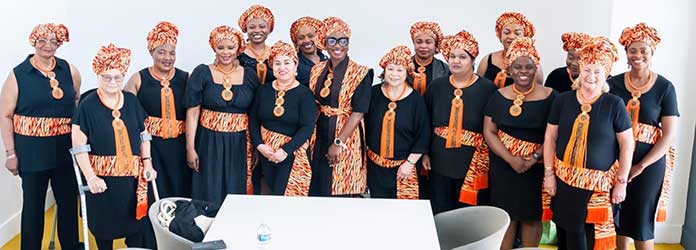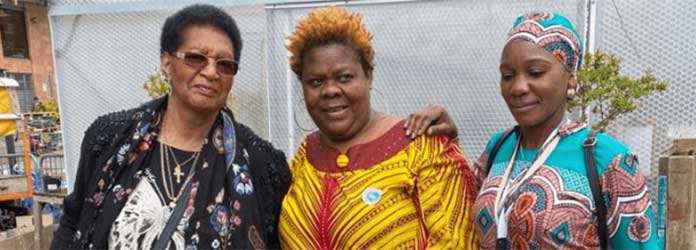Delivering cash grants to tackle the cost of care
- Published
- 28/10/2024


Part one: What are the barriers?
No Entitlement to Public Funds (for those with a NRPF status)
Part two: Understanding the impact of the Care Grant
Acknowledgements
Thank you to the grant recipients and teams at Turn2us and SAWN for their contributions. Without the generosity of the grant recipients sharing their experiences, this report would not have been possible.
Executive summary
Support and Action Women’s Network (SAWN) and Turn2us recently collaborated to deliver a cash grant to thirteen people with refugee or No Recourse to Public Fund status and care experience (those who either access social care or provide unpaid care).
We delivered 13 one-off grants which were £1500 on average. This report details the grant process and our key learnings about the profound and numerous barriers migrants face when it comes to the cost of care.
The purpose of this report is to share our learning with the grant making and migrant justice sectors and encourage cross sector conversation on the issue of the cost of care for migrants.
This programme highlighted several barriers this group faces to being financially secure. Namely, inadequate housing, challenges accessing care services and having no entitlement to public funds(for those with a No Recourse to Public Funds status).
These barriers mean people are unable to afford items essential for their care. The most common costs people struggled with were travel costs to health appointments, healthy food and heating costs. The highest cost people faced however was the NHS surcharge payment, which can cost up to £2587.50 per person every two and a half years.
Given this challenging context, our cash grant programme provided some short-term relief. As many grantees noted, their problems cannot be resolved by cash grants alone, rather, there needs to be systemic changes to the immigration and social security systems to enable them to have financial security.
Introduction
Background
Turn2us is a national charity offering information and practical support to people facing financial insecurity.
Our Care Programme started in 2022 and is a Local Programme based in Greater Manchester.
Its aim is to make people in Greater Manchester who struggle with the cost of care financially secure. We want to work with those who are furthest away from mainstream support, which is what brought us to this collaboration with Support and Action Women’s Network.
Support and Action Women’s Network is an Oldham based charity who support Black African women to help them thrive and become independent and confident individuals. Many of those who are supported by SAWN have refugee or No Recourse to Public Funds status as well as having care experience (which for this programme we define as either accessing social care or providing unpaid care).
From the beginning of the programme, it was clear that there are several barriers for this group:
- People with NRPF (No Recourse to Public Funds) cannot claim Personal Independence Payments.
- People with NRPF face an NHS surcharge, resulting in debt.
- Migrants (refugee and NRPF status) are often unaware of or distrustful of social care, leading to unmet entitlements.
To learn more about these barriers to financial security and to provide vital support for migrants (refugee and NRPF status) we ran a short-term grant fund in March 2024.
Overview of the grant
SAWN has deep relationships with many people affected by these issues and so was well placed to identify appropriate people who would benefit from the cash grant. Turn2us is a long-standing cash grant provider and has the infrastructure to deliver grants via a trusted partner.
Moreover, SAWN and Turn2us have previously collaborated on grants programmes meaning there was already a tested process in place for the programme.
We distributed 13 grants and the amounts ranged from £1000-2000, with only one grant awarded at the value of £500.
| Immigration status | # |
|---|---|
| Refugee status | 10 |
| No recourse to public funds | 3 |
| Type of care experience | # |
|---|---|
| Carer | 3 |
| Social care needs | 10 |
Thirteen respondents described their financial situation as 'very difficult'.
| Age of grantees | Number of grantees |
|---|---|
| 30-40 | 2 |
| 41-50 | 6 |
| 51-60 | 4 |
| 61-70 | 1 |
| Grantees' gender | # |
|---|---|
| identify as female | 11 |
| Identify as male | 2 |
Part 1: What are the barriers?
Methodology
To understand the types of financial barriers people are facing, Turn2us and SAWN decided on two key questions to ask in the grant application; ‘how do your care needs affect you?’ and ‘what are the biggest costs you face due to your care needs?’
Additionally, the grantees spoke with each other at length at a celebration event and completed a survey. This data gave us a good understanding of some of the key problems people face, which largely corroborated with the initial research described above. This data came from 13 people in total.
Main problems reported
The main problems grantees reported are summarised below:
- Inadequate housing.
- Difficulties accessing care services.
- No Recourse to Public Funds status.
These problems provide context for the care costs people face. The most common costs are summarised below:
- Travel costs to health appointments.
- Healthy food.
- Heating costs.
Multiple problems
It is important to note that the grantees face many problems at once. We can understand how different systems work at the same time in the case described below:
I am currently unable to work due to childcare issues, assessment appointments and my own health appointments. I live with a long-term condition as well as caring for my daughter. I am a single mum caring for my 7-year-old daughter who was born at 23 weeks and has additional needs in many areas. I am living in temporary housing and have just received my leave to remain after 14 years of waiting. Waiting to be allocated social housing. Travel costs to and from hospital appointments for myself and medical assessments and appointments for my daughter that are ongoing. She has learning difficulties, query ADHD and autism, separation anxiety.
Being disabled and a carer while navigating immigration and housing challenges are long-term, complex systemic issues. These issues lead to financial insecurity, making it difficult to afford essential activities like travelling to hospital appointments.
Inadequate housing
Housing was mentioned frequently as a challenge by grantees. In some cases, the poor quality of accommodation (usually temporary housing such as hotels) was worsening people’s health.
I live in temporary accommodation in a hotel with lots of other refugees. There are no cooking facilities here so although I am poorly with advanced kidney failure and need to eat a special diet, I cannot do this properly. I am no longer able to work due to advanced kidney failure. I am on kidney dialysis through a permanent line in my body which until this week has been once a week at hospital. Due to the condition advancing from this week my dialysis is now three times a week at the hospital which is also further away from the hotel.
We live in one room with no accessible washing/bathing facilities which I need. I need a shower chair to sit as I cannot stand as I have lost a lot of weight but need to be very clean to stop infection and dying. I keep my line clean as best I can every day with what I have. I don’t know about disability benefits, no-one has told me about this.
Challenges accessing care services
There were several issues raised relating to challenges in accessing care services:
- There is a lack of interpreters for medical appointments (and the NHS stipulates relatives cannot act as interpreters)1. This can lead to confusion around appointments and in some cases, they are being cancelled and moved.
- There is a fear of consequences for seeking help especially for people who have been in the asylum process and now have refugee status. For example, there were concerns that if you seek help for a care issue, will you be arrested? For example, there were concerns that if you seek help for a care issue, you could be arrested or have your child taken away. Relatedly, many grantees hadn't been made aware of what Social Services do.
- People are referred for health appointments that are far away from where they live, but people have no money for transport so miss their appointments.
- There is a lack of general information and education available to people seeking support. One grantee said there is an ‘assumption that you know how to read, have internet access including to find out where to go for support groups, can drive to attend appointments’.
1www.gov.uk/guidance/language-interpretation-migrant-health-guide

No Recourse to Public Funds
There are specific circumstances that people with No Recourse to Public Funds face when it comes to their care, which worsen their financial insecurity.
Namely, being prohibited from accessing benefits which are classed as public funds. This is especially harmful when it intersects with the care system. A key example is when someone can no longer work due to a health condition. When this happens, people are in a situation of neither being able to earn income nor being permitted to claim ‘public fund’ benefits. One such example is detailed below:
I am currently undergoing treatment for kidney cancer. Due to not being able to work I have no income. I have sent in a sicknote to the DWP, and I am waiting to see if I am entitled to sickness benefits, but at the moment I am in limbo. I need to pay my rent, council tax, water, gas and electric as well as buy food for my family. I am a single parent to three children. I am relying on food banks and help from organisations such as SAWN to get me through this difficult period.
Care costs
The most common costs people reported struggling with were travel, bills and food.
| Biggest care costs for the grantee | How many grantees mentioned this? |
|---|---|
| Heating | 10 |
| Travel costs (i.e. to hospital appointments, adapted taxis) | 13 |
| Organic culturally appropriate food/specific diet for health issue | 9 |
| Other costs | |
| NHS surcharge - up to £2,587.50 | |
| Pain management equipment | |
| Mental health therapies | |
| Rent | |
| ADHD toys | |
| New clothing i.e. for weight changes | |
| Toiletries i.e. incontinence pads or moisturiser for chemotherapy burns | |
| Laundry i.e. daily bed changes | |
| Hair wig i.e. for hair loss during cancer treatment | |
Most prevalent care cost
Heating
I have to keep the house warm as I feel the cold but am struggling to afford to top up my meter with having no income at the moment.
Travel
Getting my daughter to school every day and collecting her is difficult as I am at hospital three days a week now. I need to pay transport for my friend to take and pick her up.
Food
Trying to keep to my required kidney diet with no cooking facilities. I need to buy food for me and my daughter that is the right food and food I enjoy to stay well. Appropriate food to keep well. Fresh foods and fruits are expensive and where I stay there is no refrigerator to keep them fresh. The wrong foods make me ill.
Healthcare charges
Another important cost for people with NRPF status are solicitor and healthcare fees. Some visas require you to pay up to £2,587.50 every two and a half years to access the National Health Service.
This has a significant impact, with one person describing it as ‘immigration psychosis’; that the two and a half years just disappear so you are ‘stuck in an endless cycle’ of applying and then trying to get the money together for the next time. This person has had to take out loans, including from friends, to pay the costs each time and so is always worried about owing other people money.
Another grantee remarked how ‘Many people in similar situations are in serious debt because of these fees, all areas of their lives are affected including not eating well and not being able to pay bills in order to meet these costs’.

Part 2: Understanding the impact of the Care Grant
Methodology
To understand if the grant had improved people’s short-term financial security, Turn2us and SAWN decided to hold a celebration event where people would be welcome to discuss the grant and complete a seven-question survey. These were attended and completed by 11 of the 13 grantees.
Grant impact
Everyone felt the grant had made a difference to their lives. People felt ‘dignified’ because of the money – this often came from being able to help others (friends and family) with small gifts, being able to buy their favourite food or an item that they had longed for, such as a television.
Thus, the grant improved people’s wellbeing, but we would assume only a temporary improvement, which we explore in more detail later in this report. In relation to care, some of the main ways the grant had made a difference were being able to afford the following:
- Food culturally appropriate food.
- Travel: taxis to and from hospitals, taxis to school drop-off and driving lessons (transport inaccessible due to disability).
- Heating bills.
- Care items i.e. incontinence pads, ADHD friendly toys for children: ‘(the grant) Helps me with care needs as I only get 3 pads a day so I can buy more and be fresh and comfortable’. Additionally, in one case someone paid for more time with paid carers.
- Solicitor costs for healthcare charges. These costs are specific to people with No Recourse to Public Funds.
[Grantee] attended a few support groups for her daughter but was using the money she had budgeted for food to do so. But she stopped going as couldn’t keep on choosing to pay for the travel over food. The grant helped her a lot. This was the first time she was able to not worry how much a bus pass was and felt peace when spending money. She can go back to the support groups now and has been able to get some sensory toys for her daughter. The grant has helped both her daughter and her, she has noticed a big difference at home with the two of them.
KSSC case study
KSSC (alias for anonymity), a single mother seeking asylum (and therefore unable to access public funds) and suffering from a life-threatening illness, faced extreme isolation, emotional trauma, and financial struggles.
With no access to public funds, she was struggling to afford and be well enough to make the journey to get her daughter to school. She also had difficulty communicating due to language barriers. In addition to her considerable health challenges, KSSC was fleeing an abusive marriage and needed legal assistance with her immigration status. Her daughter was her only support network and so a young carer.
To strengthen her asylum claim, she required help in gathering evidence to prove that returning to her home country in Africa would endanger her life.
Her situation began to change when she connected with SAWN, joining the supportive peer network who helped her with her immigration appeal plus offered emotional support, and access to essential services.
SAWN’s assistance helped KSSC receive Leave to Remain Status in the UK. SAWN also secured a financial grant (the Turn2us Care Grant), which helped her buy essentials, travel to hospital appointments, comfortably arrange transport to take her daughter to school and improve her English, maths, and IT skills.
This support improved her confidence, resilience, and independence. Her daughter was connected to a service for young carers and has actively engaged with young people in a safe programme of diverse activities. With newfound friendships, participation in a choir, and an empowered outlook, KSSC is now more hopeful about her future, despite her ongoing health challenges.

Moreover, most grantees said the grant was already spent or will continue to be helpful for a short while longer (up to two months). Two grantees implied it would be helpful for longer than that, up to six months.
Some of the responses to the question ‘for how long the change will last?’ are described below:
- Not long, but a day without worry is worth a month of worry.
- About 2 months.
- All the money is gone paying for visa so one main problem solved, however the financial challenge and impact is there long term, and I feel like I am back to square one.
- Just a while.
- For at least 2 months.
- It helps a lot for example over 6 months plus it makes life easier. I left some for future bills.
A couple of grantees noted a need for deeper systemic change in addition to grants. Many of the grantees are engaged in systemic change work with SAWN in Oldham. One such person provided an interesting analysis:
To me the amount of money was very very big. Unfortunately, problems don’t finish and it’s got nothing to do with the amount you gave us. I wish that social care issues were equal.
Moreover, to the survey question ‘How could we change the grant to better meet you and your family's needs?’, there was an illuminating response:
Support in a more sustainable way e.g. getting a grant that’s not just sorting an immediate problem but would appreciate a grant that can help me establish a long-term solution like business growth.
Whilst a longer-term solution was not the aim of the Care Grant, it is helpful to see this come out in the survey because it supports work developing in other programmes at Turn2us, such as the Response Fund and Positive Futures funds.
These programmes are looking at how larger grants can support people to pursue their personal financial goals and aspirations, and progress towards a thriving future.
Conclusion
We know that having care needs or responsibilities can result in specific costs which can be difficult to afford.
The findings evidence how these needs intersect with refugee or NRPF status, further exacerbating people's access to care and their ability to afford care costs, in some cases generating specific care costs that others don’t face i.e. NHS surcharges.
Moreover, as one grantee explained, a cash grant can support people to feel dignified and afford some care costs, however due to the systemic nature of their problems, cash alone cannot solve them entirely.